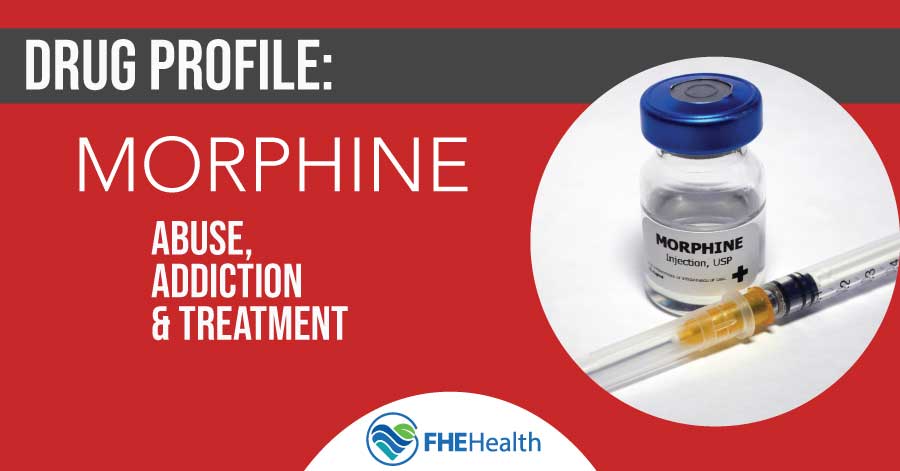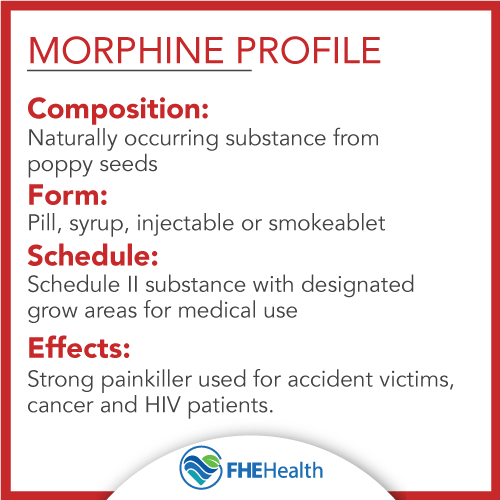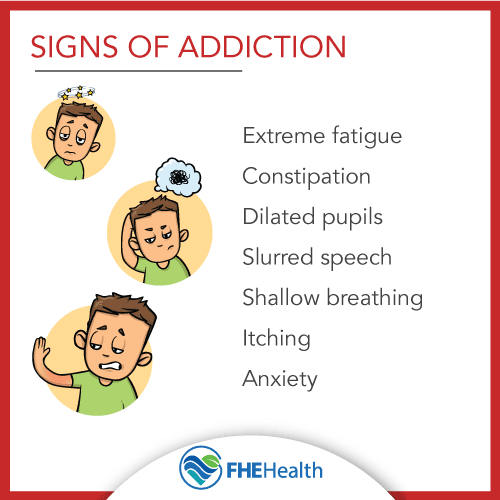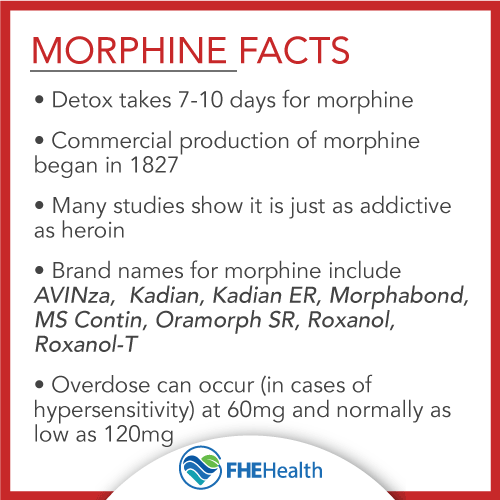
Since the early 19th century, patients struggling with pain have relied on morphine as a powerful pain reliever. Named after Morpheus, the Greek god of dreams, morphine is reported to provide a euphoric experience. By the late 19th century, physicians began to recognize the addictive properties of the opioid. Today, morphine is a Schedule II Controlled Substance, as defined by the Federal Controlled Substance Act of 1970. The drug has tragically claimed the lives of thousands of Americans each year— among them, the comedians Lenny Bruce and Chris Farley.
What is Morphine?
 A naturally occurring substance, morphine was originally derived from the poppy or poppy straw. Morphine is the most active substance in opium. During the American Civil War, morphine was extracted in a pure form and used as a painkiller. As a result, many soldiers became addicted to morphine. Today, morphine is legally grown in a handful of countries, including Australia, France, Spain, and Turkey, which have been authorized by the United Nations International Narcotics Control Board to grow the poppy plants to meet increasing demands for morphine and other opiates.
A naturally occurring substance, morphine was originally derived from the poppy or poppy straw. Morphine is the most active substance in opium. During the American Civil War, morphine was extracted in a pure form and used as a painkiller. As a result, many soldiers became addicted to morphine. Today, morphine is legally grown in a handful of countries, including Australia, France, Spain, and Turkey, which have been authorized by the United Nations International Narcotics Control Board to grow the poppy plants to meet increasing demands for morphine and other opiates.
Morphine is an opioid analgesic and is considered to be a narcotic. The medication works by changing the way that your brain and central nervous system react in response to pain. Although pharmaceutical companies have added abuse deterrent features to morphine pills, preventing them from being crushed, morphine addiction continues to rise. Commonly referred to as “monkey,” “M,” and “Miss Emma,” morphine has a similar chemical makeup as heroin. Morphine addicts consume the drug in the form of white tablets, syrup, or even injections. In rarer cases, morphine is even smoked from a pipe.
What Is Morphine Used For?
Prescribed most commonly as a pain reliever following surgeries and as a treatment for cancer-related pain, morphine has been identified as a contributor to the current-day opioid epidemic. The number of patients admitted to the emergency room who are addicted to morphine has risen by more than 106 percent over the past five years. The drug is also commonly prescribed to accident victims, chronic back pain patients, and for HIV/AIDS pain management. In addition to providing pain relief, morphine also yields a pleasurable euphoric state. Those who are prescribed morphine for chronic pain are at greater risk of misuse and eventual abuse of the drug.
Morphine is known to produce the following effects:
- Pain relief
- Stomach cramping
- Mood changes
- Drowsiness
- Feeling of calmness
- High state of euphoria
- Heightened sense of wellbeing
- Reduced anxiety
Morphine is known to be highly addictive and those who use it regularly are prone to develop a tolerance. Any time anyone uses morphine either without a prescription or in a way inconsistent with how it was prescribed, that is considered to be drug abuse.
Morphine remains in your system for an average of 90-plus days, although it can only be detected in your blood for twelve hours and in your urine for 2-3 days, according to the Centers for Disease Control. Several factors, such as age, body weight, genetics, and metabolism can influence the length of time that morphine remains in your body.
What is Morphine Addiction?
 Morphine is considered highly addictive because of how it reacts with the brain’s reward pathways. People who are prescribed morphine may quickly develop a tolerance to it. When your pain medication stops working effectively, you naturally require more to experience the same pain relieving effects. Once your body has developed a tolerance to morphine, ceasing to take it will cause withdrawal symptoms. The immediate solution for withdrawal symptoms is to take more morphine. This is how addiction begins.
Morphine is considered highly addictive because of how it reacts with the brain’s reward pathways. People who are prescribed morphine may quickly develop a tolerance to it. When your pain medication stops working effectively, you naturally require more to experience the same pain relieving effects. Once your body has developed a tolerance to morphine, ceasing to take it will cause withdrawal symptoms. The immediate solution for withdrawal symptoms is to take more morphine. This is how addiction begins.
Similar in nature to heroin addiction, morphine addiction is difficult to overcome. In addition to developing a physical addiction, morphine users also develop a psychological dependence. The most successful way to treat morphine addiction is to agree to participate in a medically managed detoxification.
If you or your loved one is addicted to morphine, you may notice some or all of the following common signs:
- Extreme fatigue
- Constipation
- Dilated pupils
- Slurred speech
- Shallow breathing
- Itching
- Anxiety
If you are a long-term user of morphine, the side effects may be more dramatic. Some of these side effects are depression, restlessness, strained interpersonal relationships, extreme constipation, and a depleted immune system. An addiction to morphine oftentimes leads to the use of heroin. According to the US Department of Health and Human Services, nearly 80 percent of heroin users report misusing prescription opioids, such as morphine, prior to heroin.
Morphine Addiction Treatment
 Detoxing from morphine is possible with a 7-10 day inpatient treatment program. Professional monitoring is highly recommended. Within 12 hours of your most recent morphine dose, you will usually notice withdrawal systems. Depression, muscle cramps and diarrhea are the most common initial symptoms. Shortness of breath and intense feelings of sickness begin to set in by Day 3 of withdrawal.
Detoxing from morphine is possible with a 7-10 day inpatient treatment program. Professional monitoring is highly recommended. Within 12 hours of your most recent morphine dose, you will usually notice withdrawal systems. Depression, muscle cramps and diarrhea are the most common initial symptoms. Shortness of breath and intense feelings of sickness begin to set in by Day 3 of withdrawal.
If your addiction is severe, you may be a candidate for medication-assisted treatment (MAT) in the form of short-term Suboxone®. Suboxone® is a partial opioid agonist that attaches to the same opioid receptors involved in producing a heroin or opiate-related high, essentially fooling these receptors into thinking they are still experiencing a morphine high when they are not.
But MAT alone is not enough to turn your life around from morphine addiction. Eliminating the desire for the opioid is a step in the right direction, but successful recovery from morphine also requires a more comprehensive plan of treatment, including participation in peer support groups and individual and behavioral therapy.
Many morphine addicts do not ensure their long-term success because they check out of rehab too early and end up relapsing. Allowing yourself sufficient time for complete withdrawal and to come to terms with your addiction while in treatment is essential if you truly desire to remain sober for years to come. Support groups are a great way to manage your morphine addiction during treatment and afterward. Individual and group therapy are also crucial to long term recovery success.
If you or a loved one suspect that you may be addicted to morphine, don’t be afraid to reach out for help. Our compassionate team of counselors are standing by to take your call 24/7. Start your journey to recovery today.






